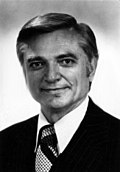| |||||||||||||||||||||||||
4 governorships 3 states; 1 territory | |||||||||||||||||||||||||
|---|---|---|---|---|---|---|---|---|---|---|---|---|---|---|---|---|---|---|---|---|---|---|---|---|---|
| |||||||||||||||||||||||||
 Democratic hold | |||||||||||||||||||||||||
United States gubernatorial elections were held in three states and one territory, on November 1, 1975, in Louisiana, and three days later in Kentucky and Mississippi. No governorships changed hands in these elections, as all three southern states remained under Democratic control.









